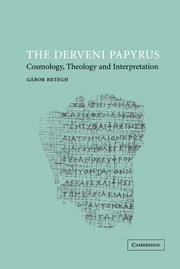Book contents
- Frontmatter
- Contents
- Preface
- List of abbreviations
- Text and translation
- 1 The find
- 2 The first columns
- 3 The reconstruction of the poem
- 4 The interpretation of the poem
- 5 The cosmic god
- 6 Cosmology
- 7 Anaxagoras
- 8 Diogenes of Apollonia and Archelaus of Athens
- 9 Physics and eschatology: Heraclitus and the gold plates
- 10 Understanding Orpheus, understanding the world
- Appendix: Diagoras and the Derveni author
- Bibliography
- Index verborum
- Index of passages
- Index of modern names
- Index of subjects
9 - Physics and eschatology: Heraclitus and the gold plates
Published online by Cambridge University Press: 23 December 2009
- Frontmatter
- Contents
- Preface
- List of abbreviations
- Text and translation
- 1 The find
- 2 The first columns
- 3 The reconstruction of the poem
- 4 The interpretation of the poem
- 5 The cosmic god
- 6 Cosmology
- 7 Anaxagoras
- 8 Diogenes of Apollonia and Archelaus of Athens
- 9 Physics and eschatology: Heraclitus and the gold plates
- 10 Understanding Orpheus, understanding the world
- Appendix: Diagoras and the Derveni author
- Bibliography
- Index verborum
- Index of passages
- Index of modern names
- Index of subjects
Summary
Heraclitus' place in the Derveni author's intellectual landscape is demonstrated by direct textual evidence: apart from Orpheus, Heraclitus is the only author mentioned by name in the surviving text of the papyrus. Besides, col. 4 contains the text of fr. B3 + B94, which – if we accept the standard dating of the Derveni text – is the earliest known quotation from Heraclitus. This quotation has, of course, raised much attention and has been extensively discussed in the literature; the main concern has been to offer a satisfying interpretation of the sentence – the two parts of which were previously known as independent fragments – both in itself and in the framework of Heraclitus' philosophy. More recently, David Sider in his contribution to the volume edited by Laks and Most has not only proposed an interesting interpretation of B3 + B94, but has also given an excellent general overview of the points of contact between Heraclitus and the text of the papyrus.
The above-mentioned papers, however, almost exclusively concentrate on what the papyrus adds to our knowledge of Heraclitus. This is the main focus of Sider's paper too, although he does indeed enlarge our understanding of the Derveni author by pointing out certain parallels with Heraclitus. On the other hand, the studies on the Derveni author's intellectual background have had surprisingly little to say about Heraclitus' place in the Derveni author's theories.
Accepting a substantial part of Sider's conclusions (with modifications and qualifications suggested by Schönbeck) the following survey is meant to be a complement to his approach: my primary aim is to examine Heraclitus' contribution to our knowledge of the Derveni author.
- Type
- Chapter
- Information
- The Derveni PapyrusCosmology, Theology and Interpretation, pp. 325 - 348Publisher: Cambridge University PressPrint publication year: 2004

